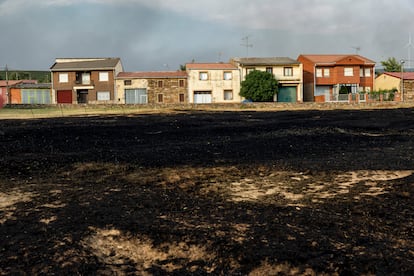Night watch in front of the fire

At 6 p.m., the fire was enveloping Castrotierra . After five days of battling one of the largest blazes in Spain's recent history, the residents of this small town, 11 kilometers from La Bañeza and 66 from León, were resigned to the flames reaching their homes. It had already happened in Villamontán, Carracedo de Vidriarles, Palacios de Jamuz, and Robledimo, and everything indicated it was only a matter of hours before it would all be over here, too. Until then, firefighters, forest rangers, seaplanes, and helicopters were fighting the flames to the point of exhaustion . Some residents pulled hoses, others aimed sprinklers watering the wheat and potatoes toward the fire, others carried sandwiches, and others, like Miguel, drove from side to side with his tractor, improvising firebreaks. Periodically, ecstatic firefighters returned from the flames, shuffling along after trying to put out the blaze with everything they had at hand: shovels, picks, chainsaws, fire bats.
If on Tuesday the residents were fighting the fire alone, on Wednesday there was no room for more logos and departments working in the area: firefighters from Castilla y León, firefighters from Castilla-La Mancha, firefighters from Portugal, the Civil Guard, the UME , eight helicopters and two seaplanes were used intensively throughout the day without managing to stop the fire that advanced like an army in formation, destroying everything. At first it was heading west, towards Robledino, but the strong wind that was felt in the area throughout the day changed its course and now it threatened Castrotierra.
It was almost nine o'clock when the clouds began to gather over the wheat and potato fields of Castrotierra: 50 inhabitants in winter and about 200 in summer. If the church hadn't been damaged when lightning struck the bell tower two months ago, many would think a miracle had happened. In less than fifteen minutes, the ochre sky of a fiery sunset turned gray and then black. Just when it seemed night had arrived abruptly, a giant roar sounded, and first one drop, then two, and finally a massive storm descended upon the town, filling the place with water. After three days of tension, the first laughter arrived with the rain to a dejected place. The residents smiled for the first time, and if before they had looked to the sky to curse the seaplanes for not having arrived sooner, now they looked up to give thanks for the saving rain.
Throughout the day, the Civil Guard had been trying to evacuate the villages in the area, but there's nothing more difficult than forcibly evacuating your grandparents' land for fear of the flames . The Civil Guard officer, who had just gone door to door calling on neighbors to obey, summed it up angrily. In some houses, they voluntarily accepted the order and headed for La Bañeza and Astorga, where they spent two nights. Other neighbors tried to make it seem like no one was home, hiding so as not to open the door while they waited for them to leave, and in a third case, they confronted them. "If no one comes to help, who's going to stay in the village to try to put out the fire and save the houses?" protested Jose, a neighbor.

When Jose's mother was evacuated to La Bañeza the day before, he didn't think twice about taking the car from Lugo, where he currently works. He had left the town as a teenager, but he remains deeply connected to a land where no one his age remains, only elderly people like his mother who spend their days going from the outpatient clinic to Mass and from Mass to the retirement home.
At 1:00 a.m. Thursday, Jose and his cousin Luis are two of the neighbors staring at the bright red flames still burning in some fields that were yellow on Saturday and are now charred. “There's fear it could come back, and we neighbors are taking turns keeping watch,” explains Luis. His cousin, who lives two houses away, won't be sleeping a wink tonight either. “The main fear is that the wind might change and the fire might flare up again. But I think it's under control. Everything is so burned that there's nowhere left to go. The only thing that can stop a fire is another fire,” he says dejectedly, staring at the flames a hundred meters away.
No sooner had he finished his sentence than Miguel appeared, getting off the tractor after clearing, plowing, and turning over yet another piece of land of the day, improvising firebreaks. One of the victims of the fires in the province of León was a volunteer trapped in the flames while trying to do something similar with a brush cutter. Miguel climbed off the tractor, exhausted. “Look at the state of our situation,” he said, pointing to the flames a hundred meters away. “They left the villages alone, and nations have always thrived thanks to the people.”
For the first time in many nights, the stars are visible after the rain dissipated the pall of smoke and particles that had covered the area. For the first time, the smell of wet earth and ash fills the air where before it smelled of burning vegetation, drying out the nose and mouth. "If this happens, I'll have to call the council member and have him call the command center because we don't even have the bells right to alert the town," he jokes.
EL PAÍS





